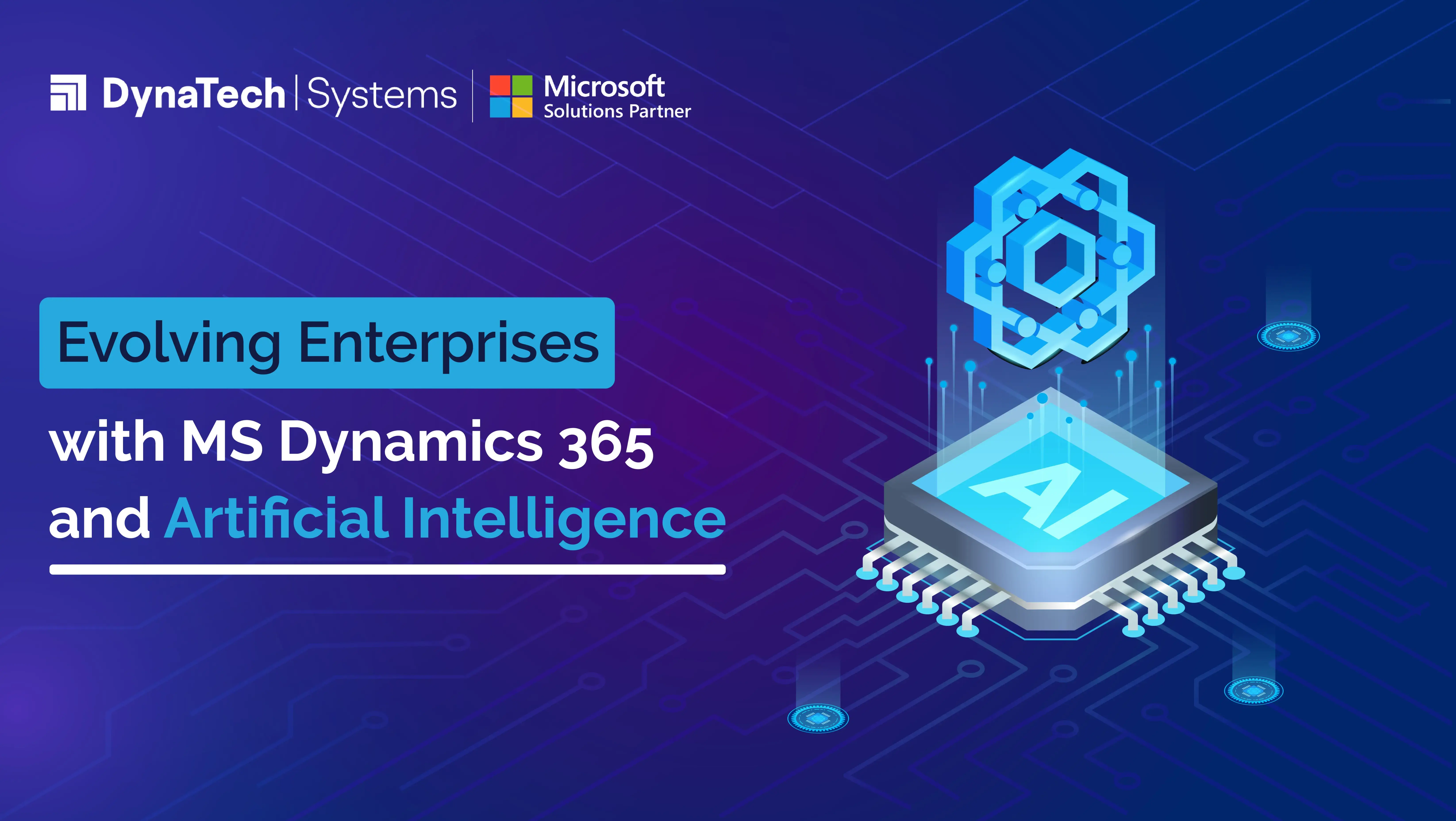Microsoft has already unveiled AI and its integration with the Microsoft Dynamics 365 product suite. This potent combination will certainly help Microsoft Dynamics 365 improve its delivery of intelligent insights. Since 77% of the world population now uses AI in some form or another, in the coming future; AI is likely to rule our daily lives.
The most recent advances in artificial intelligence permit to remove human mistake and transform data collection tools into analytical machines that offer findings with exact precision.
While AI has extended its spread across many industries, including IoT (Internet of Things), machine learning is giving the world with automation that can manage the most complicated procedures while also allowing for extra factors. When AI is combined with the cloud, it can address some of the most difficult business problems.
Merge the power of cloud computing with artificial intelligence
Without any qualms, the cloud is well-positioned to disrupt the current market landscape and give new avenues to businesses for progress. With the cloud comes the convenience of a massive infrastructure. This implies that organizations with limited computer capacity may use the cloud to access enormous data sets and reap the benefits of artificial intelligence without spending a fortune.
Concurrently, Artificial Intelligence may be utilized to address cloud-related difficulties. When essential procedures for the public and private cloud are automated and then leveraged to generate distinct functional scenarios, efficient working scenarios may be produced.
It is safer to say that AI and cloud competing are two opposite sides of the same coin.
There are several benefits when AI is integrated with cloud.
In the highly data driven digital ecosystem, if there is data, there has to be need of the artificial intelligence. AI’s intellectual abilities are best applied to large amounts of data, which become universally available and scalable when stored in the cloud.
-
Intelligent Decision making:
When analysis of the data is amplified with the help of AI, both enterprises and customers can benefit. AI could indeed propose intelligent solutions as it advances data analysis.
-
Quick data access:
Because the cloud supports large data volumes, it provides greater accessibility than conventional data storage.
-
Cost effective:
Organizations should not bother about spending money on infrastructure when they use the cloud. They can only pay for the space they require.
Understanding Microsoft Dynamics 365
Microsoft Dynamics 365 is a collection of ERP as well as CRM applications designed to handle large amounts of data. The goal of integrating Microsoft Dynamics 365 and AI was to create a powerful machine learning environment, capable of providing end-users with purposeful insights into customer trends and requirements. Furthermore, with the advent of AI, the platform quickly adapts to market conditions.
Overall, organizations can navigate their businesses toward better, more predictive results by incorporating AI-driven components.
How power of AI can transform within industries?
To meet the vertical industry specific needs, Microsoft has further created customized AI solutions.
Manufacturing:
As digital technology and IoT have accelerated, manufacturers now have access to intelligence that mirrors operational efficiency along with its business performance. AI is enabling manufacturers to accomplish more with their data, which is leading to advancements in:
-
Predictive maintenance
Enables maintenance technicians to be vigilant about repairs to reduce expensive downtime by estimating the remaining lifespan of machines and their components.
-
Performance enhancements
Assists in real-time anticipating the hazard of production disruptions, roadblocks, and safety risks, showcasing issues before they arise.
Financial Services:
Financial firms are confronted with a new crisis as customer expectations change along with surcharge of cybercrime and fraud. Therefore to handle such cha Microsoft has launched innovative new functionalities enabled by a financial services primed cloud. Among these capabilities are:
-
Next Best Action (NBA)
AI-powered NBA solutions utilize complex rules, predictive analysis, and algorithms to anticipate customer needs and, as a result, provide more relevant actions and promotional offers, resulting in increased wallet share and loyalty. It further ensures that the expectations of the customers are met.
-
Risk analytics and fraud prevention
Machine learning allows for more precise risk, fraud, and customer models, allowing financial institutions to identify hidden risks and reduce operating costs. With the aid of the Microsoft Dynamics Fraud protection, financial firms can protect themselves from the potential frauds and achieve high ROI.
Healthcare:
Clinician shortages, time and money constraints, and increased patient needs present a number of challenges for health organizations seeking to improve patient outcomes and experiences. These are some of the ways that integrating AI solutions can help to address these challenges:
-
Personalized medicine
Entails analytics-driven, individualized treatment plans based on a patient’s genetic make-up, medical history, lifestyle, and other factors, which are made possible by advances in genomics and insightful analysis of massive amounts of healthcare data. Currently, this data is not being fully utilized, but with the assistance of AI, this can be accomplished.
-
Healthcare Bot service
A cloud-based solution that allows healthcare organizations to create and implement compliant virtual health assistants capable of providing users with conversational and interacting access to pertinent healthcare services and reliable information. Recent COVID crisis exemplifies the strength of virtual health bots.
Retail:
Customers in the retail sector expect only two things: a personally tailored customer experience and an affordably priced offering that is appropriate for the services they receive. This is where AI can help:
-
Sales personalization
Enables retailers to provide customized experiences, services, pricing, and planning, reinvigorating the online and physical purchasing experience. Individual preferences now take precedence over one-size-fits-all solutions.
-
Dynamic planning and planning
Prediction models foresee demand for various products, creating ample confidence in pricing, and stocking decisions and minimizing losses from overstocks.
Education:
As evidenced by the recent COVID crisis, the Education sector can use the power of AI to make significant improvements in the realm of education. Technology is enabling unprecedented opportunities for students to better engage with the world around them and realize their full potential. AI is being used by education professionals and IT experts to solve a number of the critical problems in education. These collaborations have resulted in:
-
Classroom accessibility
AI-powered tools, such as real-time lesson translation for students who use a different language and narratives of surroundings for blind students, thus enabling teachers to make the classroom more attainable. This feature is currently being used by the majority of the world.
-
AI insights across the school
Comprehensive analytic insights into student achievement and risk across entire schools or school systems assist educators in making informed decisions about how to improve student outcomes. Understanding the students’ needs enables them to devise better enrollment processes, payment procedures, lesson plans, and so on, all of which are tailored to the students’ needs.
Public Sector:
In the scenario of the public sector, citizens want to know that their government cares about them. They want a tailored digital experience. What is the answer? Artificial Intelligence. AI tools allow governments to communicate and interact with their citizens quite effectively, reduce waste, and safeguard sensitive information. Such groundbreaking AI initiatives are causing a stir in two key areas:
-
Smart Cities
Intelligent technology created to address obstacles such as fee and toll management, traffic efficiency, water scarcity, and sustainability.
-
Citizen Services
Tools designed to make it easier for citizens to access consolidated government services via tracking, search, and interactive bots.
How AI integration is transforming across various Industries?
By integrating power of AI with MS Dynamics 365, Microsoft has provided out of the box capabilities with instantaneous time to value.
With self-healing commands, Dynamics 365 for Field Service detects, troubleshoots, and resolves equipment issues remotely. Enterprises can expand on these capabilities by connecting them to other Microsoft services such as Office, Skype, Azure, and augmented reality.
Microsoft has introduced a new class of AI applications to help customers integrate AI into their businesses by unifying data and injecting it with advanced intelligence. Such applications can be classified as follow:
- Dynamics 365 AI for Sales facilitates sellers to establish relationships and boost revenue by offering actionable insights and assisting in the creation of personalized experiences for customers.
- Dynamics 365 AI for Customer Service enhances client service and lowers operating costs by surfacing automated consumer insights and influencing virtual agents.
- Dynamics 365 AI for Market Insights enables users to monitor their brand and respond to trends swiftly by using AI models to regulate products are talked about in the market.
Because of these applications, enterprises can take easily utilized the power of AI as it is readily available.
Latest Developments adhered in Microsoft Dynamics 365
The most recent updates for the Dynamics 365 product suite were highlighted.
The most critical corporate activities have been digitally changed in Wave 1 2020 to provide tailored experiences to consumers and increase efficiency in internal operations.
Let’s take a look at them.
Customer Experiences
Many businesses have struggled to modernize their customer experiences owing to fragmented systems and data silos, but these challenges are no longer an issue owing to changes to Microsoft Dynamics 365 Customer Insights. Microsoft is offering additional first- and third-party data connections that can be updated and enabled in real-time, as well as deeper insights with Microsoft Azure Synapse Analytics.
Customers may also connect Microsoft Forms Pro to collect data on changing consumer behavior and perception, enabling users to act on insights together with customer data to update customer profiles and actions in real time, helping the business to better connect with and understand its customers.
Microsoft is also extending Customer Insights to Government Cloud Computing Environments, allowing the government to use these insights to better understand their workforce, communicate with residents, and alter cities at scale.
Customer Service
The Dynamics 365 suite of products has received new omnichannel AI enhancements, allowing the customer support staff to quickly adjust to operations. Because of the COVID-19 situation, contact centers are seeing an increase in volume, and with agents working remotely, delivery might be difficult.
AI is being incorporated into customer service modules to deliver greater insights, which improves client engagement choices. The omnichannel experience strives to supplement traditional channels as well as emerging messaging systems that clients often use, such as WeChat, WhatsApp, LINE, and others.
Furthermore, functional features like as co-browse and remote desktop are intended to increase responsibility. Service agents may monitor the customer’s screen from any location and at any time to handle any concerns.
Sales
Microsoft Dynamics 365 now supports predictive sales forecasting for both Dynamics 365 Sales and Dynamics 365 Sales Insights. Sales forecasting can also be done manually, however this is more dependent on the salesperson’s conviction in the present CRM. Manual forecasting is also supported by the Microsoft Dynamics 365 range of products. Aside from the foregoing, the Dynamics 365 package of solutions includes automated predictive sales analytics, which avoids biases and mistakes while removing the need for manual work.
The program collects and retains a large amount of data from each stage of the sales cycle. The system manages all opportunities, email activity, leads, meetings, calls, contacts, and so on. This also implies that changes are analyzed across the platform in order to find opportunities as well as leads, which are then linked to data. New capabilities such as modular forecast, unborn revenue prediction, forecast strategy selection, pipeline revenue prediction, and forecasts via hierarchy help with both strategic and tactical choices.
A new Engagement center has also been established in order to accelerate Sales. This experience enables salespeople to progress from lead to opportunity in an AI-prioritized work queue inside the context of the Dynamics 365 suite of products without switching views to take the next best step. Sellers are also helped with a warm introduction and other advice.
Finance
Microsoft Dynamics 365 Finance Insights extends the potential of artificial intelligence to the finance department. It allows you to rapidly assess your company’s cash status and take aggressive steps to enhance your present cash condition. Menial chores are automated or abolished, and the barrier of developing or employing AI-expertise is reduced, leaving you with insights to propel your organization ahead.
Projects
Microsoft is also offering a new tool, Microsoft Dynamics 365 Project Operations, to assist you in connecting cross-functional project teams, improving project visibility, and collaborating more effectively. It guarantees that divergent data silos are no longer a concern for project-centric businesses, and that their business profitability improves.
Epilogue
Enterprises may enjoy flawless B2B across operations, marketing, and sales. Intelligent supply chain solutions improve omnichannel retail experiences, and RPA (Robotic Process Automation) assists enterprises in analyzing and acting differently.
DynaTech Consultancy is a Microsoft Gold-certified partner that has strong expertise in enhancing business outcomes for our clients. We use end-to-end solutions incorporating the continuing convergence of ERP, Azure Cloud, Analytics, AI, and IoT. We are experts in Microsoft Dynamics 365 solutions including Dynamics 365 Business Central, Dynamics 365 CRM and Dynamics 365 Finance and Operations. Request a FREE consultation right now by writing us at sales@dynatechconsultancy.com




























